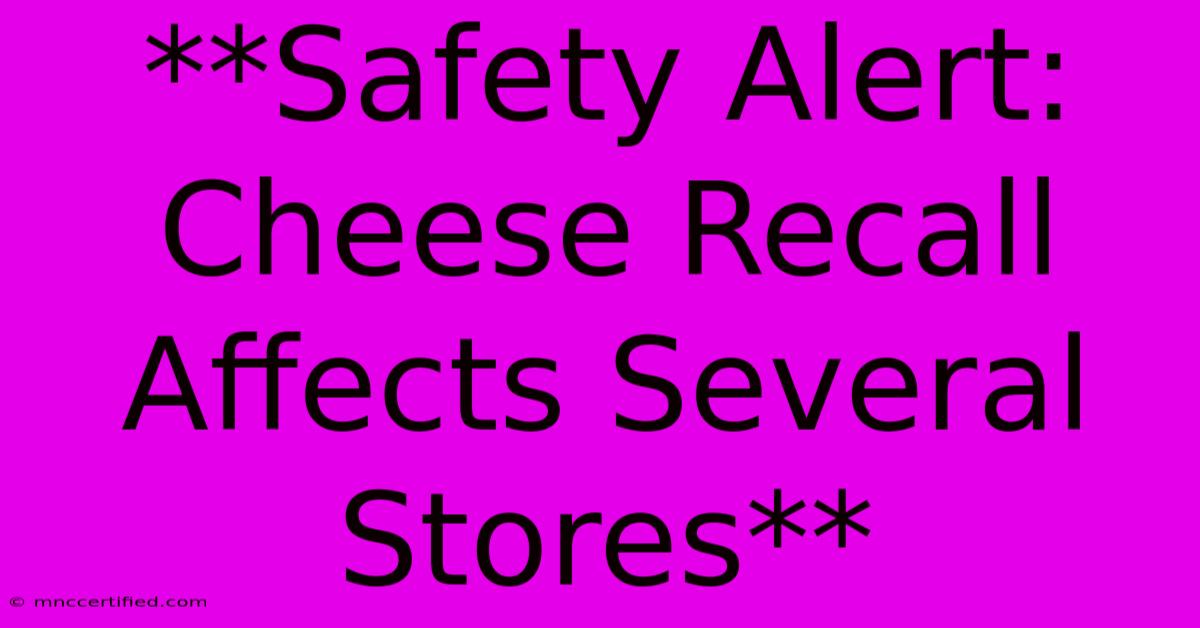**Safety Alert: Cheese Recall Affects Several Stores**

Table of Contents
Safety Alert: Cheese Recall Affects Several Stores - What You Need to Know
A recent recall of cheese products has been issued, affecting several major grocery store chains across the country. This recall is due to potential contamination with Listeria monocytogenes, a bacteria that can cause serious illness, especially in pregnant women, newborns, older adults, and people with weakened immune systems.
What Cheese is Recalled?
The recall specifically targets [insert name of cheese brand], a popular [type of cheese] found in many grocery stores. The affected products have specific lot numbers and best-by dates.
Where is the Cheese Sold?
The recalled cheese has been distributed to [list store chains] across [list affected states]. If you have purchased cheese from these stores, it's crucial to check your fridge immediately.
How to Identify the Recalled Products:
To determine if you have any of the recalled cheese, check the following:
- Brand Name: [insert name of cheese brand]
- Product Type: [insert type of cheese]
- Lot Number: [insert affected lot numbers]
- Best-by Date: [insert affected best-by dates]
What to Do If You Have Recalled Cheese:
If you have any of the recalled cheese, do not eat it. Instead, dispose of it immediately.
You can also contact [insert contact details for the company issuing the recall] for more information.
Symptoms of Listeria Infection:
Symptoms of Listeria infection can include:
- Fever
- Muscle aches
- Headache
- Stiff neck
- Confusion
- Loss of balance
- Seizures
If you experience any of these symptoms after consuming the recalled cheese, seek medical attention immediately.
Preventing Foodborne Illness:
To help prevent foodborne illness, follow these food safety tips:
- Wash your hands thoroughly with soap and water before and after handling food.
- Clean surfaces that come in contact with food.
- Cook food to the proper temperature.
- Refrigerate perishable foods promptly.
- Avoid cross-contamination between raw and cooked foods.
Stay Informed:
This recall is an important reminder to always be aware of food safety alerts. Check the [insert name of government agency] website or your local news sources for updates on food recalls.
By following these steps, you can help protect yourself and your family from foodborne illness.

Thank you for visiting our website wich cover about **Safety Alert: Cheese Recall Affects Several Stores**. We hope the information provided has been useful to you. Feel free to contact us if you have any questions or need further assistance. See you next time and dont miss to bookmark.
Featured Posts
-
Unified Minds Pokemon Trading Card Game
Nov 09, 2024
-
Why Use Mauritian Investment Platforms
Nov 09, 2024
-
How To File A Claim With Gap Insurance
Nov 09, 2024
-
Pet Shop Boys Cover David Bowies All The Young Dudes
Nov 09, 2024
-
Insurance Companies In Russellville Ar
Nov 09, 2024